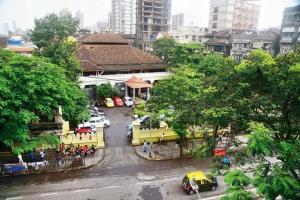Priesthood in the Zorastrian community is a hereditary role. While traditionally men serve as priests, there are a few exceptions where women have served in the role

Nearly 30 members of the Parsi community attended a weekend workshop for Mobeds — Zorastrian priests — in Sanjan, Gujarat to develop ties among themselves and promote priesthood. Six parent-child duos also participated to enrich their bonds.
Priesthood in the Zorastrian community is a hereditary role. While traditionally men serve as priests, there are a few exceptions where women have served in the role.
The workshop focussed on young Mobeds aged between 13 and 16 years bonding with their parents who are serving as priests. Activities for communication skills, positive training sessions, and simulation exercises were held.
"It was wonderful to see the baton being passed on," said Binaifer Sahukar, convenor of Empowering Mobeds, the platform that conducted the workshop. "The fathers were talking to the children about their work life, its importance, challenges they face." A mother-son duo was also present at the workshop.
Sahukar emphasised on parent-child bonding as it ensures the survival of Mobeds. "There are 50 agiaries in the city and four Atash Behrams," she said. "Given the declining number of Parsi priests, we have to try and retain the few children pursuing priesthood. The best way to do so is by monetising the profession. There has to be some incentive. Our senior priests are overburdened and are like doctors on call — running from one fire to another."
Sahukar added that the community has to support and effect this change by being more respectful and generous towards priests. "The objective of empowering Mobeds is to elevate their position to that of leaders."
Catch up on all the latest Crime, National, International and Hatke news here. Also download the new mid-day Android and iOS apps to get latest updates
 Subscribe today by clicking the link and stay updated with the latest news!" Click here!
Subscribe today by clicking the link and stay updated with the latest news!" Click here!







